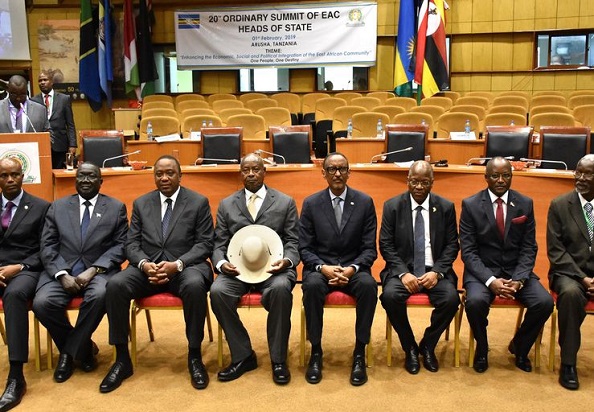The East African Business Council (EABC) is pushing for a review of the EAC protocols to transform the EAC Secretariat from a coordinating body to an enforcement agency, to make the entity more relevant.
This is because many resolutions are made at different levels of the community up to the heads of states summit, but only the willing partner states implement them, while those violating the resolutions cannot be forced or penalized.
This is evident in the failure by the EAC to fully implement the harmonization of tax policies, as well as the persistence of non-tariff barriers, because countries put national policies before the demands of regional integration. These have also seen outright confrontation between countries with some unilaterally closing their borders to neighbours.
This is part of the demands the region’s private sector wants handled by the next Heads of States Summit.
John Bosco Rusagara, the EABC Board Director recommended for the institutional review of the functions of the EAC Secretariat via elevating its role from coordination to enforcement by transforming the EAC Secretariat into a Commission. The business leaders also condemned the government in the region for doing little to cut the cost of doing business.
“EAC Partner States should fully operationalize the EAC Single Customs Territory and adopt technology to transform our EAC region to be borderless for goods and services! The Partner States should work towards to bringing down East African borders for trade to flourish,” said EABC Chairman Nicholas Nesbitt.
Speaking at a dialogue on Wednesday called to get a position of the private sector ahead of the next Heads of States Summit, the Principal Secretary State Department for EAC Kevit Desai called for public-private dialogue and collective responsibility.
“The expanding market, diversity of our people and the richness of our resources are key prospects for the economic growth and prosperity of our region,” he told the dialogue in Arusha, Tanzania.
Desai urged the business leaders to analyze EAC protocols and intra-EAC trade hurdles that need Presidential intervention to be resolved in a bid to reduce the cost of doing business in the region.
Dennis Karera, EABC Vice-Chair was concerned that the decisions that are made by the lower organs as well as the EAC heads of States Summit take too long to be implemented, citing the opening up of the regional aviation sector. Article 92 of the Treaty (Civil Aviation and Civil Air Transport) states that the EAC Partner States are required to adopt common policies for the development of civil air transport in the Community in collaboration with other relevant international organizations.
“EAC Partner States should offer local treatment to airline companies in East Africa plus reduce and align the high landing and parking fees,” said Karera as he called for open skies in the region.
Currently airlines registered in the region, just like foreign ones, are not given preferential treatment when landing in another partner state, which abets competition amongst them and lead to low profitability.
On his part, EABC CEO John Bosco Kalisa said there is need for a quick resolution of trade disputes especially on the origin of goods traded within the region. “EAC Committee on Trade Remedies Committee should be quickly established to handle matters on rules of origin, dumping and disputes that stifled intra-EAC trade which is currently below 15 percent,” said Kalisa.
Countries, particularly Uganda have consistently seen their goods blocked by other countries which claim that the have been imported from other regions. Currently, a Kenyan government delegation if due in Uganda to ascertain the capacity of the country to produce all the milk it supplies to Kenya.
Dr. Samuel Nyantahe from the Confederation of Tanzania Industries called for trust amongst partner states, saying it was vital for the implementation and building consensus on EAC commitments and protocols.
In her response, Waturi Matu, the Senior Private Sector Technical Advisor to the EAC urged the private sector to join efforts and harmonize country position on the fourth band of the EAC Common External Tariff to fast-track adoption by the EAC Partner States. This should go a long way in solving some of the current contentious issues especially regarding trade.
The meeting listed ratification of the African Continental Free Trade Area by South Sudan, Regional Local Content Policy, Adoption of EAC Tourist Visa, Ratification of the EAC Agreement for the Avoidance of Double Taxation and Abolishment of work permit fees requirements for the East African citizens as some of the issues to be put before the heads of state.
Others were the East African Standards Committee (EASC) to declare the standards, Removal of telecommunication roaming charges & taxes and Adoption and implementation of mutual recognition of Covid 19 test and vaccination certificates through the EAC Pass.
Juma Charles from the South Sudan Chambers of Commerce Industries and Agriculture and Yowa Soso, Chairman of South Shippers Council said Presidential pronouncements are important to fast track the EAC regional integration agenda and commended H.E. President Salva Kiir for exempting East African citizens from visa requirements.
Edward Kitonga from the EAC Secretariat explained that the EAC Common Market Protocol is under review and the EAC – EABC Technical Working Group has enabled closer dialogue between the private sector and the EAC Secretariat.
-URN





